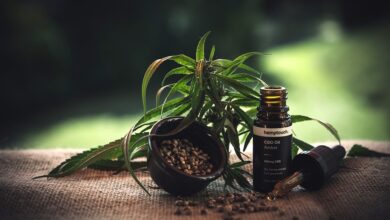The Rising Importance of Hemp Extraction in the Cannabidiol (CBD) Industry

The CBD industry has experienced significant growth in recent years, with more and more people turning to CBD products for health and wellness benefits. As the demand for CBD continues to rise, so does the importance of hemp extraction in the production of high-quality CBD products.
Hemp, a variety of the cannabis plant, is a rich source of CBD, a non-psychoactive compound known for its potential therapeutic properties. In order to extract CBD from the hemp plant, specialized extraction methods are used to ensure the purity and potency of the final product.
The importance of hemp extraction in the CBD industry cannot be understated, as it directly impacts the quality and efficacy of CBD products. In this article, we will explore the rising importance of hemp extraction and its significance in the CBD industry.
Why is Hemp Extraction Important in the CBD Industry?
Hemp extraction plays a crucial role in the CBD industry for several reasons. Firstly, it is the process by which CBD is isolated from the hemp plant, allowing for the production of highly concentrated CBD products. This extraction process ensures that the final product contains a high concentration of CBD, making it more potent and effective for consumers.
Additionally, hemp extraction is important for removing unwanted compounds from the hemp plant, such as THC, the psychoactive compound found in cannabis. By carefully extracting CBD from hemp, manufacturers can create CBD products that are free from THC, making them safe and legal for consumers to use without the risk of intoxication.
Furthermore, hemp extraction allows for the production of a wide range of CBD products, including oils, tinctures, capsules, edibles, and topicals. The ability to extract CBD from hemp in its purest form allows for the creation of diverse and innovative CBD products that cater to different consumer preferences and needs.
Techniques for Hemp Extraction
There are several techniques commonly used for hemp extraction in the CBD industry, each with its own advantages and drawbacks. The most common methods of hemp extraction include:
– Solvent Extraction: This method involves the use of solvents such as ethanol, butane, or CO2 to extract CBD from the hemp plant. Solvent extraction is efficient and yields a high concentration of CBD, but it may also leave trace amounts of solvents in the final product if not properly removed.
– Supercritical CO2 Extraction: This method uses carbon dioxide at a specific temperature and pressure to extract CBD from the hemp plant. Supercritical CO2 extraction is considered one of the most effective and safe methods, producing high-quality CBD products without residual solvents.
– Lipid Extraction: This method involves the use of fats or lipids to extract CBD from the hemp plant. While lipid extraction is relatively simple, it may not produce as high a concentration of CBD as other methods and can result in a lower-quality final product.
The choice of extraction method can significantly impact the quality, purity, and potency of the CBD product. Therefore, it is essential for manufacturers to carefully select the most suitable extraction technique to ensure the highest standard of CBD products for consumers.
The Importance of Quality Control in Hemp Extraction
Quality control is of utmost importance in the hemp extraction process to ensure the production of safe and effective CBD products. Manufacturers must adhere to strict quality control measures at every stage of hemp extraction, from sourcing high-quality hemp plants to the final production of CBD products.
Sourcing high-quality hemp plants is the first step in the hemp extraction process. It is crucial to use hemp plants that are grown organically and free from pesticides, herbicides, and other contaminants. This ensures that the final CBD product is free from harmful substances and maintains its natural integrity.
Additionally, manufacturers must carefully monitor the extraction process to maintain the purity and potency of the CBD product. Quality control measures such as lab testing, analysis of cannabinoid content, and the removal of residual solvents are essential to producing high-quality CBD products that meet regulatory standards and consumer expectations.
The Rising Importance of Hemp Extraction in the CBD Industry
The rising importance of hemp extraction in the CBD industry reflects the growing demand for high-quality CBD products and the need for stringent manufacturing standards. As the CBD market continues to expand, consumers are becoming increasingly discerning about the quality and efficacy of CBD products, driving the need for advanced hemp extraction methods and quality control measures.
Furthermore, the legalization of hemp-derived CBD in many countries has opened up new opportunities for the development and commercialization of CBD products. With an influx of new CBD brands entering the market, the competition to produce top-tier CBD products has intensified, emphasizing the role of hemp extraction in maintaining industry standards and consumer trust.
The Importance of Education and Transparency
As the CBD industry continues to evolve, it is essential for manufacturers to prioritize consumer education and transparency in their hemp extraction processes. Providing consumers with information on how CBD is extracted from hemp, the quality control measures in place, and the purity of the final product is key to building trust and confidence in CBD brands.
FAQs
Q: What is the difference between hemp and marijuana?
A: Hemp and marijuana are both varieties of the cannabis plant, but they differ in their chemical composition and use. Hemp contains high levels of CBD and trace amounts of THC, while marijuana contains high levels of THC and lower levels of CBD. Hemp is primarily used for industrial purposes and the extraction of CBD, while marijuana is used for recreational and medicinal purposes.
Q: Are there any risks associated with hemp extraction?
A: When conducted properly, hemp extraction is generally safe and poses minimal risk to consumers. However, some extraction methods may involve the use of solvents, which can leave residue in the final product if not properly removed. It is important for manufacturers to employ safe and effective extraction techniques and adhere to strict quality control measures to ensure the safety of CBD products.
Q: How do I know if a CBD product has been properly extracted from hemp?
A: To ensure that a CBD product has been properly extracted from hemp, look for third-party lab testing and analysis of the product’s cannabinoid content. This will provide information on the concentration of CBD and the presence of any residual solvents or contaminants. Additionally, reputable CBD brands often provide detailed information on their extraction methods and quality control measures, demonstrating their commitment to producing high-quality CBD products.
In conclusion, the rising importance of hemp extraction in the CBD industry underscores the significance of quality control and consumer trust. As the demand for high-quality CBD products continues to grow, it is essential for manufacturers to prioritize advanced hemp extraction methods, rigorous quality control measures, and transparent communication with consumers to meet industry standards and deliver safe and effective CBD products.
[ad_2]
